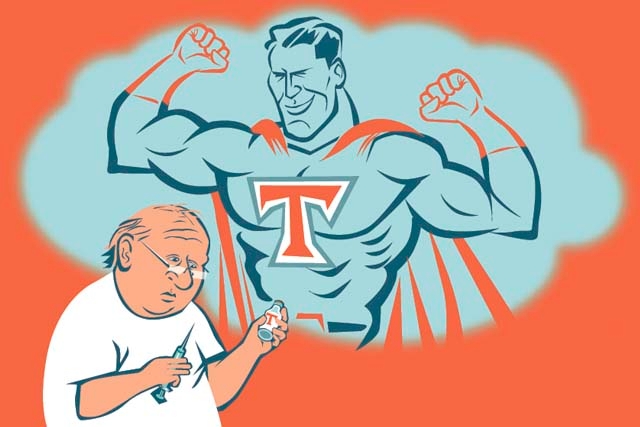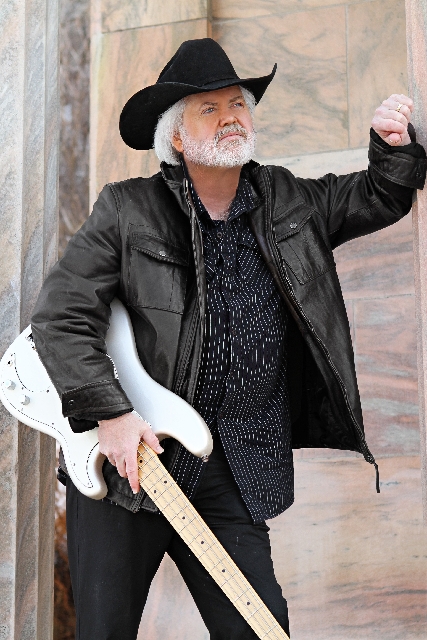A Boost in Testosterone: Therapy has helped some men
Depression. Loss of interest in sex. An inability to build muscle or lose weight. A general sense of lethargy.
They’re symptoms that may be familiar to many middle age and older men, and symptoms that, those men might assume, are just a normal part of aging.
But the depression and lethargy Merrill Osmond experienced as he entered middle age felt, he was sure, far outside the bounds of what anybody would consider “normal.”
The 59-year-old member of the performing Osmond family even admits that, at times, he felt so depressed that thoughts of suicide entered his mind.
Only after Osmond sought medical help did he discover that what he was feeling was due to something that sounds pretty prosaic: low testosterone.
Osmond now undergoes testosterone replacement therapy and says that he feels better — more upbeat, more energetic, happier — than he has for a long time.
Osmond certainly isn’t the only man for whom the natural reduction of testosterone production that comes with age has resulted in some very real emotional and physical effects.
However, doctors say that determining whether testosterone is the problem — and, then, deciding whether testosterone replacement therapy is warranted — isn’t as simple or as straightforward a process as a layman might assume.
Testosterone is a hormone that is associated in men with sex drive, the production of sperm and the building of muscle mass and strength.
A man’s production of testosterone typically peaks during adolescence and early adulthood. Dr. Alvin B. Lin, a family medicine and geriatrics specialist and associate professor at the University of Nevada School of Medicine, said that, starting in a man’s 30s or 40s, testosterone production typically drops, on average, about 1 percent a year.
This natural decline in testosterone production sometimes is referred to as male menopause or andropause. But it is more correctly called hypogonadism. It isn’t analogous to female menopause, Lin said, because hypogonadism in men is not associated with the more abrupt drop-off of estrogen production and the loss of reproductive capability women experience.
The term hypogonadism actually refers to two issues, Lin added. One is the decrease of testosterone production, which can be measured through a blood test. The other involves the clinical symptoms low testosterone may cause.
TRICKY DIAGNOSIS
Dr. Mark Leo, a Las Vegas urologist, said a number of patient complaints might tip off a physician to the possibility that low testosterone may be a problem.
“Low libido — low sex drive — that’s the big one,” Leo said. Others can include erectile dysfunction, difficulty in achieving orgasm, a decrease in muscle mass, weight gain, loss of bone density and “a general feeling of decreased energy levels, fatigue and depression.”
However, said Dr. Michael Petruso, a Las Vegas internal medicine physician, “that’s not the same thing as saying that everybody with depression or anxiety or low muscle mass or bone density has low testosterone.”
For example, feelings of fatigue and low energy might also be associated with colon or pancreatic cancer or a thyroid condition, Petruso said.
High blood pressure or heart disease could be at play in a patient’s complaints of erectile dysfunction, Lin said, while untreated clinical depression unrelated to low testosterone could affect a patient’s emotional state.
“This is where it gets really tricky and here’s why there’s so much argument: Because the symptoms overlap with a number of other diagnoses,” Lin said.
A physician wouldn’t automatically say, “You have low energy and mood disorder and, oh, your testosterone is low, so we’ll fix it by fixing your testosterone,” Petruso said.
“Many other things can cause mood disorder and low energy,” he said. “You want to go through a work up and carefully make sure you’re treating the right thing.”
“Normal” testosterone levels in the blood can range from 220 to 1,100 nanograms per deciliter, Leo said. That wide spectrum of “normal” exists because testosterone levels vary throughout the day. Typically, they’re highest in the morning hours, and test results can vary depending upon when the test is given.
Finally, Lin said, a man whose testosterone level tends toward the low end of normal may experience no symptoms while a man with a higher level of testosterone may experience symptoms. Numbers from a test are useful only when considered within the context of a complete medical exam.
“If a patient is not complaining about anything wrong, don’t go looking for a number, because there certainly are some complications associated with testosterone (replacement therapy), just like any medication,” Lin added. “It’s not a free lunch.”
OSMOND’S STORY
There was no doubt in Merrill Osmond’s mind that low testosterone was exactly what was ailing him.
Responding to questions via email from Europe, Osmond said that, before learning about low testosterone, he had been to many doctors over the years for depression.
Lithium was the main drug of choice, he said, but the stability he received from the drug came only in spurts. “I would feel up and then I would go crashing again.”
He tried other antidepressant medications. But, Osmond said, “the other symptoms that were going on at the same time were, for sure, hormonal.”
Doctors prescribed testosterone patches and shots, but nothing worked.
Osmond said he even confided to his doctor that “I had thought of even taking my life because of the depression I was experiencing.”
Eventually, Osmond learned about SottoPelle Therapy, a Scottsdale, Ariz.-based company that offers natural hormone replacement therapy. In Osmond’s case, pellets are placed under the skin that release hormones gradually into his body. Osmond said the pellets are implanted every six months or so in a process that is “not uncomfortable at all.”
“When the treatment of hormones finally kicked in, weight loss started immediately,” Osmond said. “My mindset stabilized and depression wasn’t there as much and I started to feel energy. My libido became normal and active again.”
Osmond now is a spokesman for SottoPelle. And, he said, “I never felt better in my life.
“I live a very normal life,” he said. “I’m watching my diet, eating just good, healthy foods. Other than that, I’m not doing anything different. The weight is coming off in droves. I’m exercising more, now that I have more energy. I’m trying to continue to keep the depression from getting me down.
“I have been a much happier person than (I) have been for many, many years,” Osmond said.
If low testosterone is found to be the cause of a man’s symptoms, and if testosterone replacement therapy is warranted, the treatment can take a number of forms. Leo said common delivery methods include testosterone gels or creams that are rubbed into the skin, skin patches, injections into the muscle or — as in Osmond’s case — pellets that are inserted under the skin.
NO MAGIC PILL
Currently, there are no effective and safe oral therapies. Leo said, “There are some products in Europe that are very toxic to the liver.” Absorption from pills is poor, he said, and much of the testosterone from a pill is destroyed in the gastrointestinal tract.
Patients also must be monitored for side effects that can include negative mood changes, oily skin, prostate enlargement, high blood pressure, changes in blood cholesterol, enlarged breasts and blood changes that can be associated with heart attack or stroke, Lin said.
Petruso said there also is not “a good study that tells us the risks and benefits of long-term testosterone replacement in a large group of men.”
Leo said men with breast or prostate cancer — which may be linked with testosterone — “have to be treated very judiciously,” and patients who are taking medications for high cholesterol or blood thinners also should be monitored.
However, Leo said that for men whose lives are being adversely affected by low testosterone, therapy can offer a night-and-day difference.
“I would say, in general, the vast majority of patients respond quite well,” he said. “They’re very happy and would be very, very unhappy if they had it taken away.”
AWARENESS OR MARKETING?
Physicians say more men today seem to be aware of low testosterone and its potential effects. One reason may be that baby boomers always have tended to be focused on their health. Another may be that low testosterone has become a higher-profile medical condition thanks to TV commercials from pharmaceutical companies, clinics that specialize in treating low testosterone and even the rebranding of hypogonadism as the catchier “low-T syndrome.”
More men are asking about low testosterone during doctor’s office visits, Lin said. But he wondered whether that is a function of “raised consciousness about this condition” or of “the pharmaceutical industry having more product to sell.”
“I’m not quite sure I have a good answer for why,” Lin said. “But I think certainly (this) generation is being a little bit more health-conscious.”
Leo, too, has noticed more patients mentioning “low-T” during visits.
“Is it marketing or real? I think it’s both,” he said. ”There are patients who have seen those commercials and started asking questions of themselves and are curious.”
Iain Buxton, chairman of the department of pharmacology at the University of Nevada School of Medicine, said, “This is one of those things driven by marketing.”
Because of advertising, “I think men have been presented with this option without the public debate, without physicians being asked responsibly whether this is something they should be asking me to do,” Buxton said.
A lab result showing low testosterone “might be very useful” in making a diagnosis of a patient’s complaints, Buxton said. “But what if you get a guy coming in and he says, ‘I was watching TV this week and I’m sure I’ve got this low-T. Now what can you do about it?’ ”
Petruso agrees that the commercials increase awareness.
“I don’t think that’s necessarily bad,” he said. “I just wouldn’t be in favor of rampant, indiscriminate replacement of testosterone, particularly in men as they get older and are at risk for other diseases.”
Contact reporter John Przybys at jprzybys@
reviewjournal.com or 702-383-0280.























